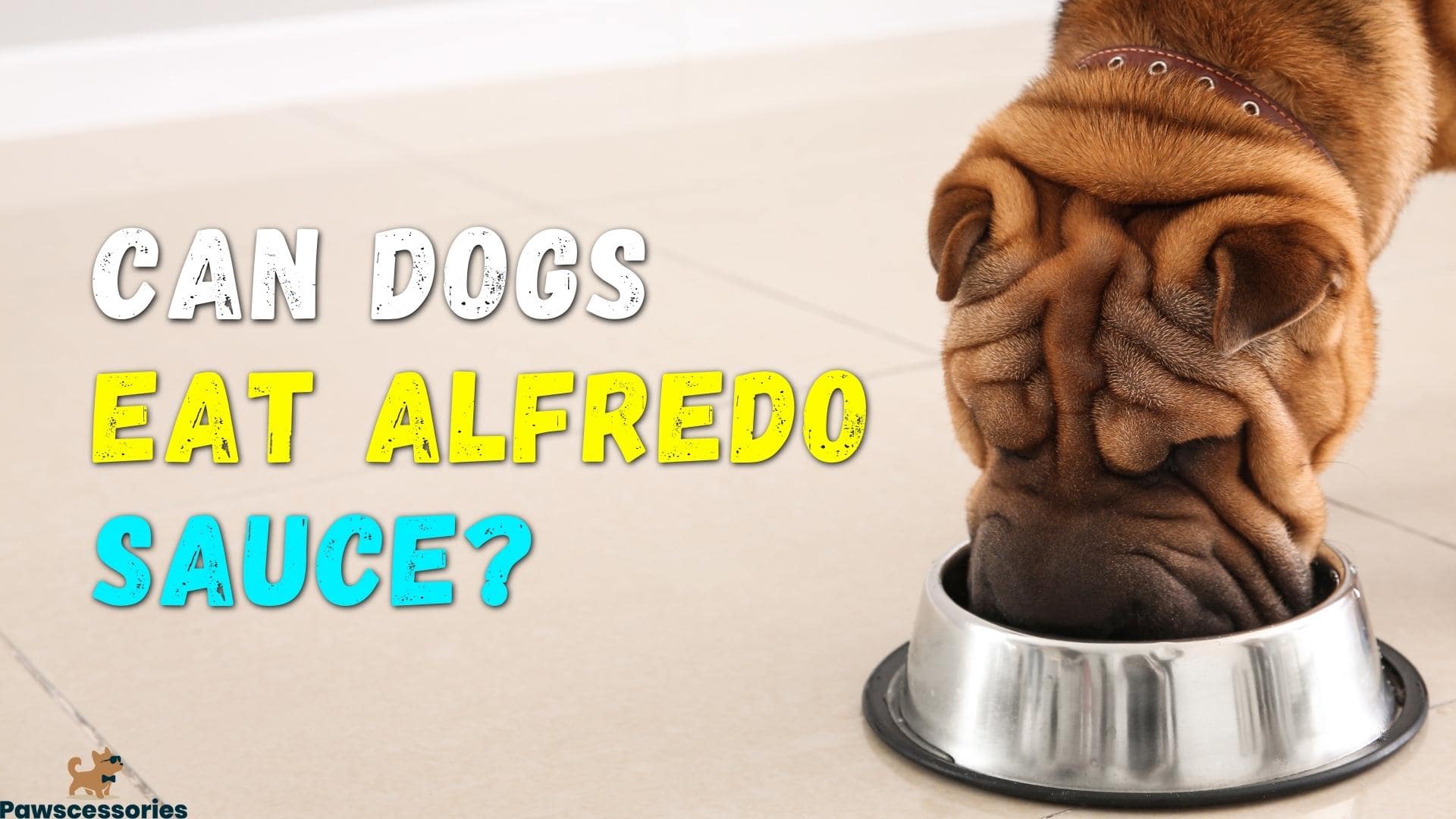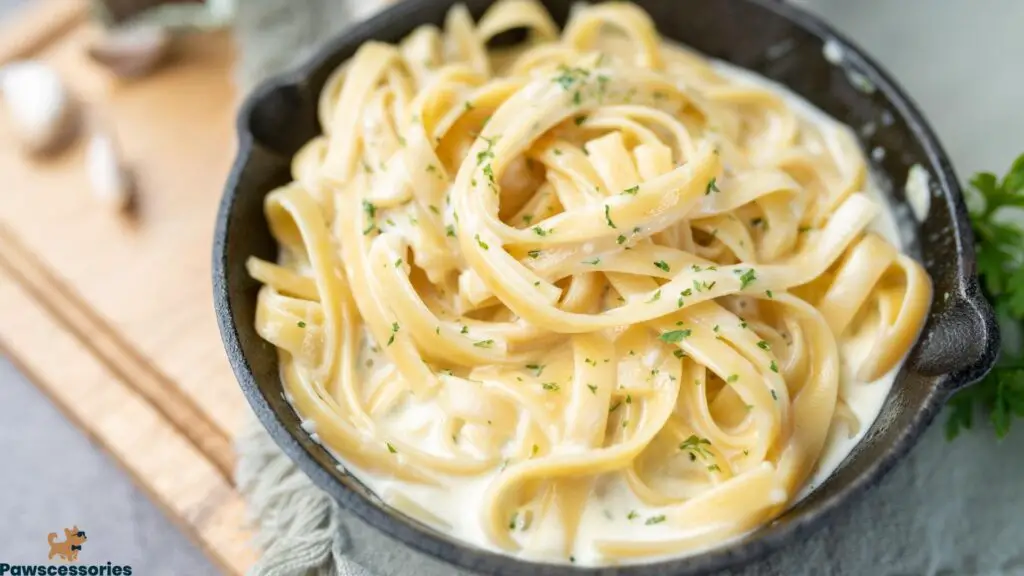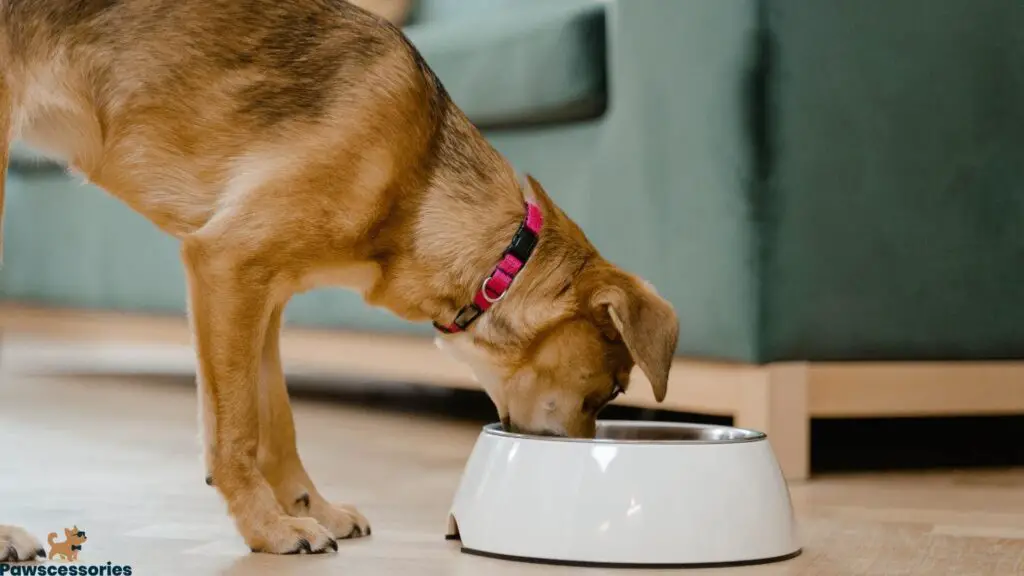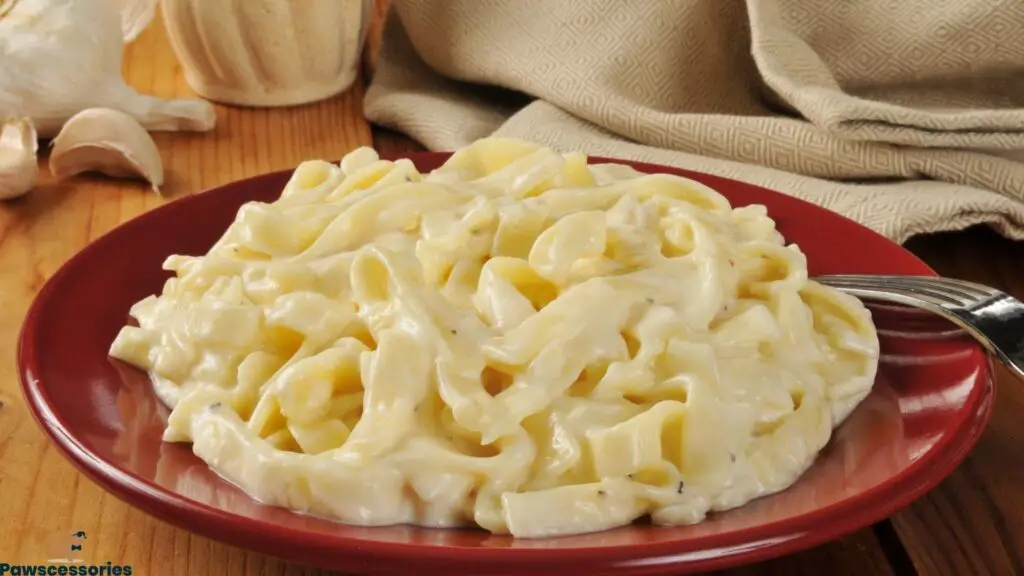Pawscessories is reader-supported. When you buy via links on our site, we may earn an affiliate commission at no cost to you.
Learn more.
Many dog owners are curious if it’s okay to give their pup a taste of alfredo sauce. After all, it’s a creamy, delicious dish that many humans enjoy.
But can dogs eat alfredo sauce? Is it safe for dogs?
In short, no, dogs should not eat alfredo sauce. Alfredo sauce contains heavy cream, butter, parmesan cheese, and garlic. The high dairy contents, salt, and fat in this sauce don’t sit well with most dogs. Also, large quantities of garlic or salt can be very toxic to dogs.
In this article, you’ll discover:
- Why alfredo sauce is bad for dogs
- The dangers associated with dogs eating alfredo sauce
- What to do if your dog eats alfredo sauce (or too much of it)
Let’s dive in.
Table of Contents

Can Dogs Eat Alfredo Sauce?
No, Dogs Should Not Eat Alfredo Sauce.
Alfredo sauce is made with tons of dairy products like heavy cream and butter and parmesan cheese.
Diary does not sit well with dogs and will usually result in an upset stomach depending on the quantity consumed.
On top of that, there’s usually garlic and sometimes onion in alfredo sauce which are both toxic to dogs in large quantities.
Alfredo sauces also require seasoning with salt, pepper, and other spices to add some flavor. Unfortunately, these can irritate your dog’s bowls and cause diarrhea and vomiting.
Plus, alfredo is exceptionally high in salt, which for dogs can be extremely dangerous since too much salt can cause salt poisoning.
All in all, alfredo sauce is not something you should be feeding your dog, no matter how much they beg for it.
What Is Alfredo?

Alfredo is a rich, creamy, white pasta sauce made with heavy cream, butter, minced garlic, and parmesan cheese.
It’s often used to top pasta dishes, the most common dish being fettuccine Alfredo.
The sauce originated in Rome, Italy, and is named after its creator, Chef Alfredo di Lelio.
There are many different recipes for alfredo sauce nowadays, but here are the most common ingredients in a traditional alfredo sauce.
Alfredo Ingredients
- Unsalted butter
- Heavy whipping cream
- Italian seasoning, salt, and pepper
- Parmesan cheese
- Garlic
A lot of recipes will also use nutmeg and onions.
Alfredo Nutrition
*This is for 1 serving of a classic alfredo sauce
Calories: 455kcal | Carbohydrates: 10g | Protein: 19g | Fat: 39g | Saturated Fat: 19g | Cholesterol: 99mg | Sodium: 949mg | Potassium: 117mg | Fiber: 1g | Sugar: 1g | Vitamin A: 1052IU | Vitamin C: 2mg | Calcium: 461mg | Iron: 2mg
As you can see, alfredo sauce is usually very high in sodium and fat, with very few nutritional benefits for a dog.
So can dogs eat alfredo sauce? No, they should not.
4 Dangers Of Dogs Eating Alfredo Sauce

There are always dangers when it comes to dogs eating human foods.
Foods like alfredo contain high levels of sodium, fat, dairy products, and toxic ingredients like garlic (and sometimes onion).
These ingredients put your dog at risk more so than other foods.
Here are the biggest concerns with dogs eating alfredo sauce:
#1 High In Bad Fats
Alfredo sauce is loaded with saturated fats, which can cause pancreatitis in dogs.
Pancreatitis is life-threatening condition that occurs when the pancreas becomes inflamed. It can happen when dogs eat fatty foods or if they have a genetic predisposition.
Its most common to develop in smaller dogs, but all dogs are at risk. Symptoms of pancreatitis in dogs include:
- Loss of appetite
- Vomiting
- Diarrhea
- Weight loss
- Dehydration
- lethargy
- Tenderness in the abdomen
- Fever
The best way to prevent pancreatitis is to avoid feeding your dog fatty foods like alfredo sauce.
#2 Garlic & Onion Toxicity
As I mentioned before, alfredo sauce usually contains garlic and sometimes onion.
These ingredients can be toxic to dogs in large quantities and can cause anemia.
Symptoms of garlic and onion toxicity in dogs include:
- Vomiting
- Diarrhea
- Lethargy and weakness
- No appetite
- Pale gums
- Fainting
- Increased heart rate
- Difficulty breathing
- Ataxia (lack of coordination)
- Red or brown discolored urine
- Hyper-salivation
It takes only 100 grams of onion (roughly the size of a medium onion) per 20 kilograms of dog weight to induce toxic side effects.
For example, a 45-pound dog would only need to eat 1 medium to large-sized onion to experience dangerous toxicity levels.
To induce harmful changes in a dog’s blood with garlic, 15 to 30 grams of garlic per kilogram of body weight is necessary.
To put things into perspective, a clove of supermarket garlic weighs between 3 and 7 grams on average.
So although alfredo sauce may not have enough garlic or onion to cause severe issues, it’s best to avoid feeding your dog alfredo pasta.
#3 High In Sodium
Sodium is another ingredient in alfredo sauce that can be dangerous for dogs.
Eating foods high in sodium can lead to dehydration or in severe cases salt toxicity. Salt toxicity in dogs is rare but can be deadly.
Symptoms of sodium toxicity include:
- Vomiting
- Diarrhea
- Lethargy and weakness
- Seizures
- Unconsciousness
- High body temperature
- Pale gums
- Muscle tremors or spasms
- Increased heart rate
- Loss of appetite
- Respiratory distress
- Tongue swelling
- Stomach pains
- Walking without balance
#4 Dairy
Many dogs are intolerant to lactose, the sugar found in milk, and other dairy products.
A small percentage of dogs (about 15%) lack the enzyme needed to properly digest lactose, which can cause vomiting and diarrhea.
Other symptoms of dairy intolerance include:
- Bloating
- Excessive flatulence (passing gas)
- Greasy, soft, or watery stools
- Lethargy
- Nausea
- Vomiting

Other Frequently Asked Questions
Can Dogs Eat White Pasta Sauce?
No, dogs should not eat white pasta sauce. White pasta sauce is typically made with heavy cream, butter, and cheese, which can be difficult for dogs to digest. Additionally, white pasta sauce is often relatively high in salt, which can be dangerous for dogs if they overeat.
Can Cats Eat Fettuccine Alfredo?
No dogs should not eat fettuccine alfredo. While the fettuccine noodle on its own would be okay for dogs to eat, the alfredo sauce makes it a terrible choice. The alfredo sauce is typically made with lots of dairy, bad fats, salt, and garlic. These ingredients are terrible for dogs and can make them very sick if they eat too much.
Can Dogs Eat Cheese Pasta Sauce?
No, dogs should not eat cheese pasta sauce. Cheese pasta sauce is typically made with lots of dairy products, bad fats, and salt. These ingredients can be problematic for dogs to digest and make them very sick if they eat too much.
Can Dogs Eat Alfredo Noodles?
No, dogs should not eat alfredo noodles. While the noodle on its own would be okay for dogs to eat, the alfredo sauce makes it a bad choice for dogs. The sauce has too much dairy, bad fats, lots of salt, and garlic. These ingredients are all harmful to a dog.
Other posts you may find interesting:
Can Dogs Eat Spaghetti & Meatballs? (We Asked a Vet)
